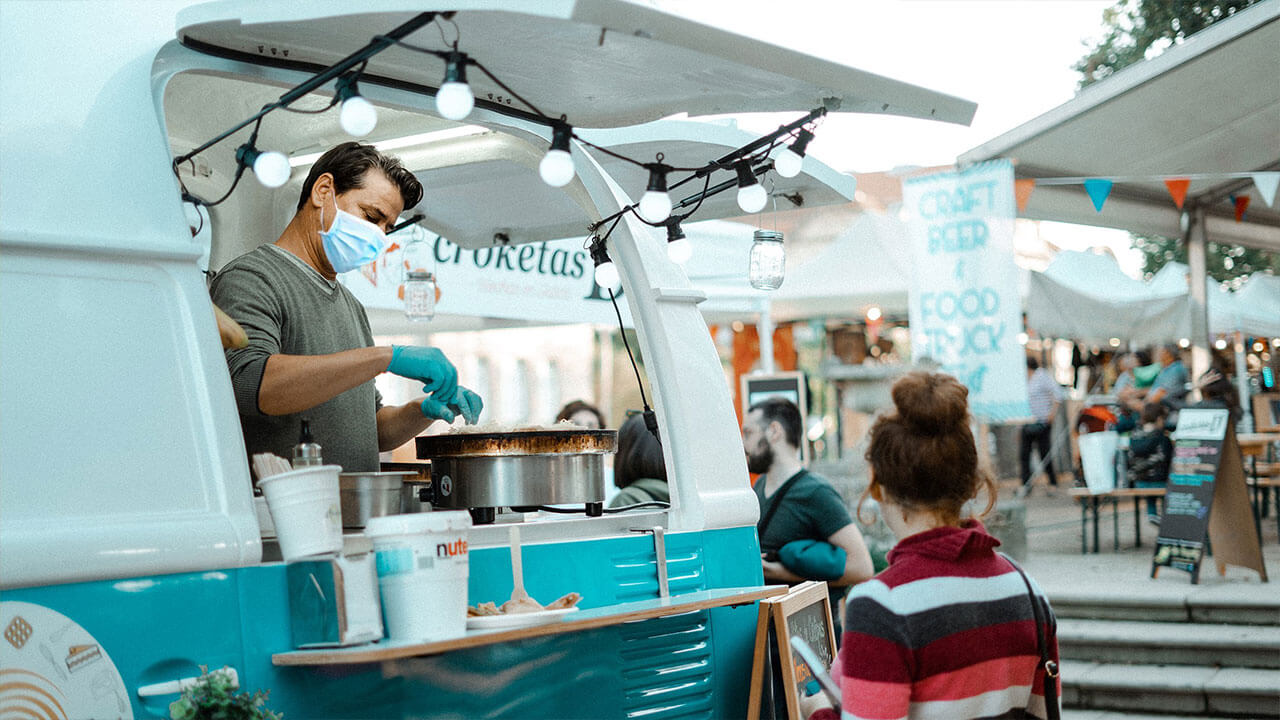Food Trucks Offer Multifamily Communities Tasty Amenity

While the world has been cooped up because of stay-at-home orders and forced to cook at home or get take-out, the food truck industry is straying from its traditional business model to give multifamily residents a tasty perk that operators are embracing.
Since the onset of the coronavirus pandemic, gourmet food trucks have added apartment communities to their regular stops.
Roaming Hunger, the nation’s largest provider of food truck catering, is working with multifamily businesses to provide daily or weekly food options for residents. The company is based in Los Angeles, the birthplace of gourmet food trucks, and represents more than 18,000 food trucks and catering businesses.
Lately, Roaming Hunger has been creating custom food truck programs for apartments to provide residents a break from their kitchens and sample some local delicacies. Trucks loaded with specialty cuisines as well as American table fare are anchoring in parking lots and outside community centers just a few steps from residents’ doors.
The concept, which ultimately is bringing communities closer together, is catching on. Roaming Hunger is working with 40 multifamily housing operators to host 140 events nationwide.
In one week recently the company received 62 leads, mostly from Texas, Missouri, Colorado and Tennessee.
“Food Truck Fridays” are fast becoming the norm, and helping rolling chefs replace revenue lost from the cancellations of festivals and community events and closed offices.
“We are seeing an uptick in resident event inquiries,” said Mircea Vlaicu, a marketing specialist at Roaming Hunger. “We are building out specific programs for apartments and making sure they are a success for the residents and trucks.”
Adapting to changing conditions to feed citizens
The program strays from Roaming Hunger’s traditional business model of booking fees for catering-style events typically hosted by large companies or at public events.
For apartments, the company uses a public-event model, which allows hungry patrons to buy directly from the truck. In some ways, a concept similar to the old mobile food unit system that became popular in the 1970s and 80s at industrial sites.
The big difference is that these food trucks are delivering a more top-shelf food experience and just about every type of cuisine that can be grilled, sautéed or fried in a mobile kitchen.
At apartments across the country, pizza is doing pretty well because it’s the ultimate comfort food, Vlaicu said. Burgers and tacos are popular, too, and there’s always room for desserts like shaved ice or mint chocolate chip gelato.
Food trucks overcome the ‘roach coach’ stigma
Food trucks emerged from the Great Recession as a low-cost option for restaurant owners to bring their creations to the public. Since then, they have become fixtures at community events and corporate parties, as well as at parks and festivals along with street food vendors.
The kitchens have overcome the stigma of mobile food units, or “roach coaches,” which were loaded with plastic-wrapped hot dogs, cold-cut sandwiches, chips and candy and delivered in institutional gray and white panel trucks. Urban delicacies like Korean-Mexican fusion food to grilled mortadella prepared by respected chefs highlight cook-to-order menus. Some trucks specialize in dishes created with ingredients produced by local farmers.
The concept has become a colorful fixture of the food industry with economic firepower. In 2018, the food truck industry was valued at $1 billion and enjoying annual growth at a rate of about 7 percent.
Trucks resemble small RVs with state-of-the-art kitchens and often are branded with bright paint and tempting food creations.
Places like Austin, TX, Portland and Los Angeles have encouraged food trucks to set up shop through special laws, and cities are dishing out accolades for popular choices. In New York City, the Vendy Awards held its first street food competition in 2018 and awarded five companies in categories including Best Breakfast and Rookie of the Year. Royal Halal, which specializes in food native to Bangladesh served in an elaborate trailer, was awarded the Vendy Cup.
More recently, the U.S. Federal Highway Administration recognized the need for mobile food kitchens to serve long-haul truck drivers delivering consumables during the pandemic. Beginning in early April, FHWA allowed states to permit commercial food trucks to operate and sell food in designated Interstate highway rest areas.
Working with apartments for successful outcomes
Roaming Hunger has tailored specific programs that fit individual communities need to ensure that residents can have a unique food experience and give truck operators the incentive to return.
With every apartment booking, Roaming Hunger works with the community to pitch the truck, typically with flyers that can be posted on community bulletin boards within resident portals or emailed to residents.
“You have to work hard and work with the apartments to make it a success,” Vlaicu said. “If a truck shows up and makes $100 they are not coming back. We take the risk of making sure the truck is successful so that other trucks will come.”
Also, to comply with CDC social-distancing guidelines, residents can order ahead to minimize standing in line. Trucks are held to high sanitation standards to ensure everyone’s safety, he added.
Apartments can opt for a trial period before making a long-term commitment.
Providing a community service and adding value for residents
Vlaicu says the concept is a way apartments can be good Samaritans to their community by helping out the food industry and providing residents a little something special.
“A big value is knowing you’re helping a small business get through this tough time,” he said.
The program has been successful enough that Roaming Hunger continues to reach out to properties and management companies to scale the program.
“We’re realizing the value for us and the apartment community is long-term,” he said.